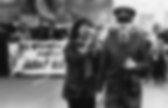

Christchurch City Libraries. DigitalNZ. Don Franks speech. This year marks the 25th Anniversary of the 1981 Springbok tour.
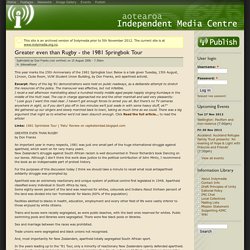
Below is a talk given Tuesday, 15th August, 12noon, Clubs Room, VUW Student Union Building, by Don Franks, anti apartheid activist. Excerpt: Many of the big ’81 demonstrations were held on public roadways, as a deliberate attempt to stretch the resources of the police. The manouver was effective, but not infallible. I recall a wet afternoon marshalling about a hundred mostly middle aged people happily singing Kumbaya in the middle of the Hutt road. The cop in charge approached me and the other marshall and said very pleasantly: " Look guys I want this road clear.
Links: 1981 Sprinkbok Tour | 'Patu' Review on capitalismbad.blogspot.com GREATER EVEN THAN RUGBY by Don Franks An important year in many respects, 1981 was just one small part of the huge international struggle against apartheid, which went on for very many years. Sex and marriage between the races was prohibited. John Selkirk Photography. National Library Topic Explorer. New Zealand Geographic. The opening ceremony of the Montreal Olympics was televised live in New Zealand from 7 am on Sunday, July 18, 1976, and those New Zealanders who rose early to watch turned on their set with some trepidation.
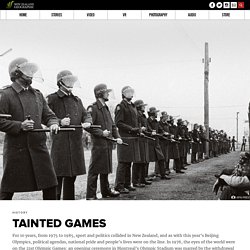
The national teams marched through and symphonic music sounded across a stadium crammed with 75,000 people. Then came the ringing vowels of Queen Elizabeth in her Hardy Amies pink suit and hat, declaring open the 21st Olympiad of the modern era. Two young athletes, one French and one English—to reflect a bicultural Canadian nation—entered the stadium and together ran the Olympic torch around the track. 1981 Springbok tour. NZ Journal of Public History. Inside the 1981 Springbok tour - The Listener. Thirty years after the 1981 Springbok rugby tour, Police have given the Listener access to previously classified documents.
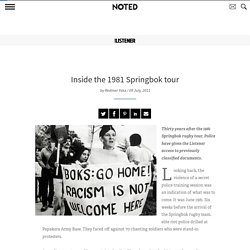
Looking back, the violence of a secret police training session was an indication of what was to come. It was June 1981. Six weeks before the arrival of the Springbok rugby team, elite riot police drilled at Papakura Army Base. They faced off against 70 chanting soldiers who were stand-in protesters. According to a trove of long-restricted police files released to the Listener, three police required medical treatment for injuries after the training drill. Over 56 gruelling days that winter, it was tough on New Zealand, too: the country was convulsed by ugly division, naked urban terrorism and a sustained civil disturbance unmatched in its history.
The hundreds of documents reviewed by the Listener depict a decentralised, sluggish organisation at times panicked by the biggest and most difficult policing operation in its history. Worse was to come. NZ On Screen. NZ Security Intelligence Reports on 1981 Springbok Rugby Tour Protests. Release of NZSIS Reports on 1981 Springbok Rugby Tour Protests 21 December 2011 This year marks the 30th Anniversary of the 1981 Springbok rugby tour of New Zealand.
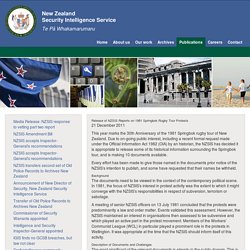
Due to on-going public interest, including a recent formal request made under the Official Information Act 1982 (OIA) by an historian, the NZSIS has decided it is appropriate to release some of its historical information surrounding the Springbok tour, and is making 10 documents available. Every effort has been made to give those named in the documents prior notice of the NZSIS’s intention to publish, and some have requested that their names be withheld.
Background. Puke Ariki - Springbok Tour Forces Brave Decision. By Virginia Winder Graham Mourie: Said 'no' to tour.
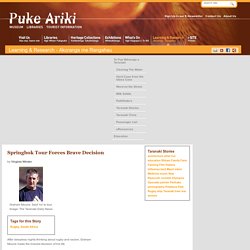
Image: The Taranaki Daily News Graham Mourie: Said 'no' to tour. Image: The Taranaki Daily News After sleepless nights thinking about rugby and racism, Graham Mourie made the bravest decision of his life. The Springbok Tour Of 1981 – 25 Years On. SOUTH AFRICAN CONSULATEWELLINGTON (NZ)Gregory FortuinHonorary Consul for the Republic of South Africa Wednesday 19 July 2006.
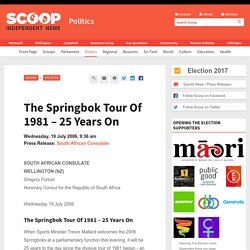
The Springbok Tour Of 1981 – 25 Years On When Sports Minister Trevor Mallard welcomes the 2006 Springboks at a parliamentary function this evening, it will be 25 years to the day since the divisive tour of 1981 began - an event that set mate against mate and divided a nation. Te Ara – Anti-racism and Treaty of Waitangi activism. New anti-racist groups In the early 1970s new anti-racism organisations were formed to address the consequences of colonisation.
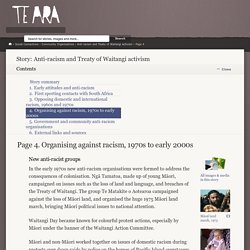
Ngā Tamatoa, made up of young Māori, campaigned on issues such as the loss of land and language, and breaches of the Treaty of Waitangi. The group Te Matakite o Aotearoa campaigned against the loss of Māori land, and organised the huge 1975 Māori land march, bringing Māori political issues to national attention. Waitangi Day became known for colourful protest actions, especially by Māori under the banner of the Waitangi Action Committee. Māori and non-Māori worked together on issues of domestic racism during protests over dawn raids by police on the homes of Pacific Island overstayers, who had come to New Zealand on temporary work permits, and over the return of Māori land at Raglan in 1978 and at Bastion Point in Auckland in 1982. University of Canterbury - Springbok Rugby Tour papers. Collection Summary.
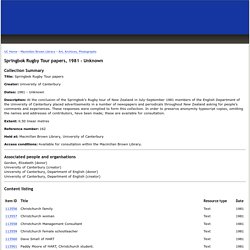
Wellington City Library - Springbok Tour 1981. Introduction "A woman show signs of battle after protesters and red squad police clashed at the Luxford Street-Rintoul Street intersection during anti Springbok tour demonstrations in Wellington, 1981.
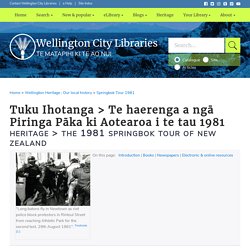
" Footnote [3.] Topic specific resources available in the Memorial Library.